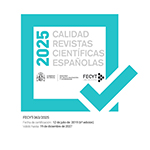“Only one mother”: the invention of good/bad mother models in Peru in nineteenth and twentieth centuries
Abstract
The article seeks to analyze the social and racial construction of maternal models of the good and bad mother in contemporary Peru (19th and 20th centuries). The study is carried out in a decolonial feminist methodological perspective applied to history studies, mobilizing sources of diverse nature that go from medical archives, press, administrative documentation to anthropological works. The results of this research show how the Western model of the good mother served to essentialise social gender roles and legitimise the hegemony of the group of Creole descendants and the white mestizo population. Although all women were considered inferior to men and destined for motherhood, only certain women - white and from the wealthy classes - inherited the quality of "matrons" and "patriotic mothers". The rest, indigenous, Afro and mestizo women, on the other hand, appeared to a greater or lesser degree as second-class mothers, who had to be trained, controlled and in some cases even limited in their reproduction. The originality of this contribution lies in the analysis of motherhood as a space of coloniality, that is, as a network of power relations of a patriarchal, racial and class order that classifies and hierarchizes Peruvian women, which is a social feature that remains to this day.
Downloads
Article download
License
In order to support the global exchange of knowledge, the journal Investigaciones Feministas is allowing unrestricted access to its content as from its publication in this electronic edition, and as such it is an open-access journal. The originals published in this journal are the property of the Complutense University of Madrid and any reproduction thereof in full or in part must cite the source. All content is distributed under a Creative Commons Attribution 4.0 use and distribution licence (CC BY 4.0). This circumstance must be expressly stated in these terms where necessary. You can view the summary and the complete legal text of the licence.











